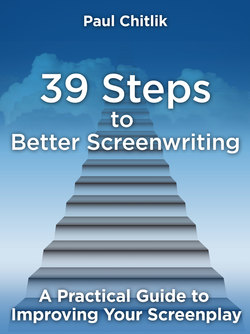Читать книгу 39 Steps to Better Screenwriting - Paul Chitlik - Страница 7
На сайте Литреса книга снята с продажи.
ОглавлениеStep 1
In The Beginning
Has this happened to you? You’re at a party and someone starts talking to you and finds out that you’re a writer. Two types of conversations invariably start (once they’ve asked you if they’ve seen anything you’ve written. How would you know what they’ve seen?): 1) I have a great idea. Let me tell it to you; you can write it; and we’ll split the profits. 2) I have a great idea, I just don’t know where to start.
If it’s the former, you should just stop the conversation with, “I’ve got so many of my own ideas I haven’t written yet, I just can’t take on another project,” because it’s practically guaranteed that the other person’s idea is no more thought out than “something about flowers” (actually pitched to a former writing partner for a Twilight Zone episode), or my office/house/school is a real sitcom. These are not ideas. They are nothing. And the hard part is not coming up with an idea, it’s expanding that idea, developing it enough so that it really is something, and then writing it. So, in fact, if you say yes to that profit sharing, it should be 99% for writing it and 1% for the “idea.” That will shut them up.
Or maybe the person has an idea of his/her own that s/he just doesn’t know how to start. This question was put to me at a recent Christmas party. The other guest, a relative by marriage and a man I respect, just couldn’t seem to get started on his idea for a script. He’s written tons of stuff. He has worked as an historian and NPR radio host. He knows his ass from a hole in the ground. He’s just stuck.
He said that this happens even when writing an article, and he might spend all day thinking about the opening line. Once he gets that, he says the rest just spills out of him. But he’s been kicking around this idea in his head for years, and he can’t find the first sentence.
So I offered a way to start. I said I can’t write your first sentence, but I can certainly write your first word: “The.” Now, all you have to do is finish the sentence and you’re on your way.
Okay, it was a smart-ass answer to a gnawing problem that many writers have. But the only real answer is you have to have something on paper before you can call yourself a writer; and even if you start with the humblest of words like “the,” or even “a,” you have written something. You just have to find the next word, and then the next, and pretty soon you’ve got something. If it all looks just too big to tackle, well, cut it down to the basics and just write the seven points in seven sentences (see my book, REWRITE: A Step-by-Step Guide to Strengthen Structure, Characters, and Drama in Your Screenplay, for more information on the seven points). You can write seven sentences, can’t you? And from there you can write forty or so sentences with each describing a scene, and from there you can write a treatment that describes the story in detail, and then you can write the screenplay.
Step by step you build your screenplay. Yes, there are other things you should do, like write bios of the main characters, maybe work out a time line, figure out the sub-plots, think about what you really want to say with the story, etc. But that looks like a lot to approach all at once. If you can just write the first word, you start to climb that mountain step by step. Then you can eventually reach the joy time in every writer’s life when s/he can go from writing to having written.
